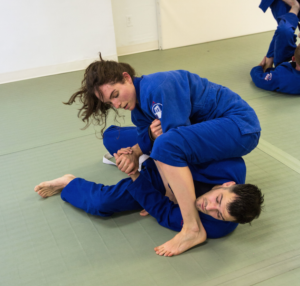If you’ve done it for more than a few weeks, you know that training in the martial arts is more than just getting fit, learning a few techniques and hoping for the best.
Hidden in the practice are a series of problem-solving routines that help us to untangle not just what to do in stressful self-defense situations, but how to handle the problems and challenges that show up in our lives day to day.
 Asking questions is an excellent way to expand your knowledge base in the martial arts classroom…and it’s a great habit to develop if you’re interested in your personal growth off the mat as well.
Asking questions is an excellent way to expand your knowledge base in the martial arts classroom…and it’s a great habit to develop if you’re interested in your personal growth off the mat as well.
Whenever you ask a question, by definition you’re moving outside the range of what you already know. And if you’re asking yourself good questions, you’re activating your creative, problem-solving side.
So what’s the best way to start asking yourself these good questions?
Well, there’s good news and bad news.
The good news is that your brain will always present an answer to any question you ask yourself. The answer may not necessarily be true, but your brain “feels” obligated to respond to your questions, and will do its best to present you with some kind of answer.
The bad news is that if you’re asking the wrong questions (or the right questions in the wrong way), you can end up without good answers. Here’s an example.
“Why am I always failing?” can easily lead to an answer like, “Because I can’t understand this stuff.”
“How can I succeed in this venture?” primes you to consider more creative and useful answers.
Sometimes, especially if we’re stuck with a problem we can’t seem to get rid of, “why” questions can lead us in circles. So one approach is to replace our “why” questions with action questions:
* How can I do this?
* What do I need to do next?
* When do I need to finish this?
* Where do I need to be right now?
* What do I need to learn here?
*Who can I ask about this problem?
*What can I do differently?
Reframing the problem illuminates the path out of it. It doesn’t mean we don’t need to ask “why” questions…just that if we’re really in the trenches with a relationship issue or a dip in motivation, we need to solve the trouble first, then circle back to figure out where it came from.
So… what do you ask yourself in every situation? What is your overall attitude towards your life?
So work to developing a few “subconscious” problem-solving skills. Adjust your questions for better answers. You’ll find it can be a great benefit when it comes to working through issues in training as well as the rest of life.
Learn more about the training at Brooklyn Brazilian Jiu-Jitsu.
Want to get started with us? Here’s how (click here).





